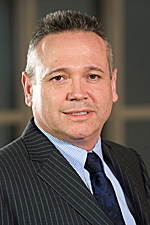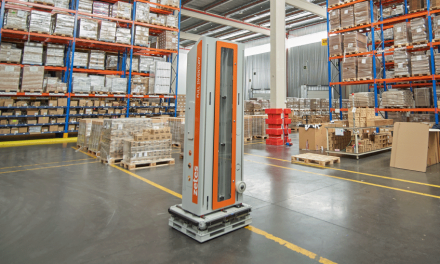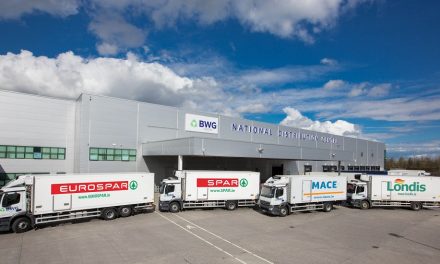
M-commerce fuels next generation fulfilment systems for last mile
Zetes managing director Andrew Southgate discusses the influence of mobile technology on the next generation of retail fulfillment. It is a challenging time to be working in retail logistics. Together with difficult trading conditions, the proliferation of mobile devices – smartphones, tablets and the ubiquity of wireless technology – is forcing a shift in the way consumers expect to interact with brands and buy goods.
As with soaring ecommerce activity, sales volumes through m-commerce channels are also expanding rapidly with purchases in the UK, France and Germany combined expected to reach £9.1 billion this year, over 50% higher than the total spent in 2011.
This is based on findings published by the Centre for Retail Research (CRR) and Kelkoo, which predict that Britain will be by far the biggest market in Europe for mobile commerce.
As e-commerce and m-commerce have continued to rise in importance, experts have stopped focusing so heavily on multichannel and now moved on to talk about an omnichannel world.
The difference is subtle. Multichannel describes the way retailers have launched a variety of business operations to support different distribution channels, these may not be as joined up a customer might expect. In an omnichannel business, the operations are completely integrated, which means a customer can literally hop between different sales channels and get the same seamless service whether they are buying in a store, online, from a phone, kiosk or a franchise.
With electronic commerce being such big business, getting fulfilment right has become more important than ever. In the warehouse, this means fundamentals like picking operations need to be streamlined, because picking single orders is time consuming and therefore expensive.
The largest retailers may look to full automation to reduce their cost base but this isn’t usually an option for small to mid sized retailers who cannot justify the capital outlay and need more flexibility.
Here systems like voice technology have proved their worth as a way to simultaneously cope with traditional bulk orders going onto retail outlets and single item e-commerce sales.

Andrew Southgate, Zetes managing director
Fulfillment
One area that has seen perhaps the biggest technological improvements is last mile fulfilment. Typically performed by a third party service provider, this is a critical aspect of the overall sale – and indeed overall brand experience – to get right, especially as the value of individual orders has increased beyond the £150 mark.
Now that consumers are spending more online, they expect to be able to track items purchased right through the delivery chain as a standard offering.
Many logistics operators offer real time traceability as part of their proof of delivery (POD) service. There is also a new breed of advanced electronic POD systems coming onto the market, such as the next generation ‘ecoPOD’ system, which have extended the entry level functionality to notify the sender within 2 hours of a delivery being due and providing a full audit trail from initial collection to final delivery point.
Using GPS tracking capability, advanced proof of delivery systems incorporate additional features that support achieving operational and sustainability priorities like lower costs and reduced carbon footprint.
Apart from improving the customer experience as goods are received, next generation proof of delivery systems like the ecoPOD can also make a significant contribution to reducing the cost of fulfilment provision itself.
As fully paperless systems, they remove all unnecessary administration and re-keying of information, which, in addition to eliminating errors, allows the overall number of deliveries that can potentially be made in a day to be increased, improving efficiency and profitability for the service provider.
In line with the rise in m-commerce transactions, recent innovations in the development of new mobile payment gateways are now being incorporated into next generation proof of delivery systems.
So as well as providing irrefutable evidence that an item has been safely received, payments can also be taken immediately at the point of delivery, or alternatively, refunds issued instantly, upon collection.
Offering a means for fulfilment service providers to diversify into profitable new business areas with the provision of value added services, these clever new payment gateways are highly secure and include integrated chip and PIN verification from a single device.
Apart from the positive impact on business competitiveness, having the ability to incorporate payment on delivery/refund on collection functionality has a further beneficial effect on cash flow, as cash-to-cash accounting cycles are reduced due to better visibility of the delivery cycle.
And this further reinforces the more intangible benefits of proof of delivery systems, which foster deeper trust between the buyer and seller through service excellence and transparency of information.
Improving efficiency and saving money are obvious priorities when implementing proof of delivery systems, but technologies like ecoPOD are also making an important contribution to overall carbon footprint reduction within logistics as a whole.
In a recent study conducted by Zetes, driver behaviour monitoring through its POD system resulted in customers achieving a 40% reduction to operating costs through more efficient vehicle management, improved driver route optimisation and reduced fuel consumption.
Managed service
Just as proof of delivery solutions are advancing both in terms of the breadth of functionality offered and their contribution to carbon footprint reduction, they are also evolving in terms of the way they are being delivered.
The current unstable economic climate has heightened awareness of the need for careful risk management. For many businesses, their continued success requires a careful balancing act between the need to invest in new technology to improve competitive advantage and the inherent risks capital expenditure brings.
Managing cash flow and preserving working capital are strategic priorities and technology providers need to adapt accordingly to give users the flexibility they require. A new breed of suppliers are offering fulfilment solutions like voice picking and proof of delivery as a fully managed service.
This approach completely removes any risk associated with the investment by allowing companies to effectively spread the cost as a fixed term commitment. In many cases, such initiatives include the provision of the entire solution – including latest handheld devices, next generation proof of delivery software and ongoing support and device management – as a monthly fee which is accounted for as ongoing ‘opex’ rather than one off ‘capex’.
It is proving highly attractive for businesses looking for ways to give their service provision an edge, whilst at the same time, giving a boost to productivity.
TNT’s Benelux operation provides an interesting example to highlight how adopting a proof of delivery system as a managed service made better financial sense. Its customers expect to be able to check the status of deliveries at any time.
TNT regards proof of delivery as essential and the only way to really distinguish their brand from the competition, by maintaining the highest service levels and offering customers full transparency on the status of their deliveries. However TNT wanted to avoid having ownership of the responsibility for ensuring the availability of the scanners. Their calculations showed that organising stocks, maintenance, repairs and spare parts amounted to a time-consuming and burdensome activity.
As an alternative, Zetes offered TNT the latest handheld devices and an advanced proof of delivery system based on a managed service contract to provide 620 scanners in perfect working order at all times, for a fixed price each month. The contract guaranteed full service uptime for TNT, because any driver reporting to the warehouse with a faulty scanner receives a fully operational device within thirty minutes.
Other companies across Europe are following suit with Nightline, Ireland’s biggest independent fulfilment provider also investing almost EUR 1m in an advanced proof of delivery solution based on a monthly, managed service.
For companies looking for ways to ensure they retain their competitive edge, service excellence is everything. The next generation of proof of delivery systems available allow users the ability to simultaneously achieve this whilst innovating with new services like mobile payment and balance the risks of their investments in technology.
Andrew Southgate is managing director at Zetes and specialises in proof of delivery and fulfilment solutions.












